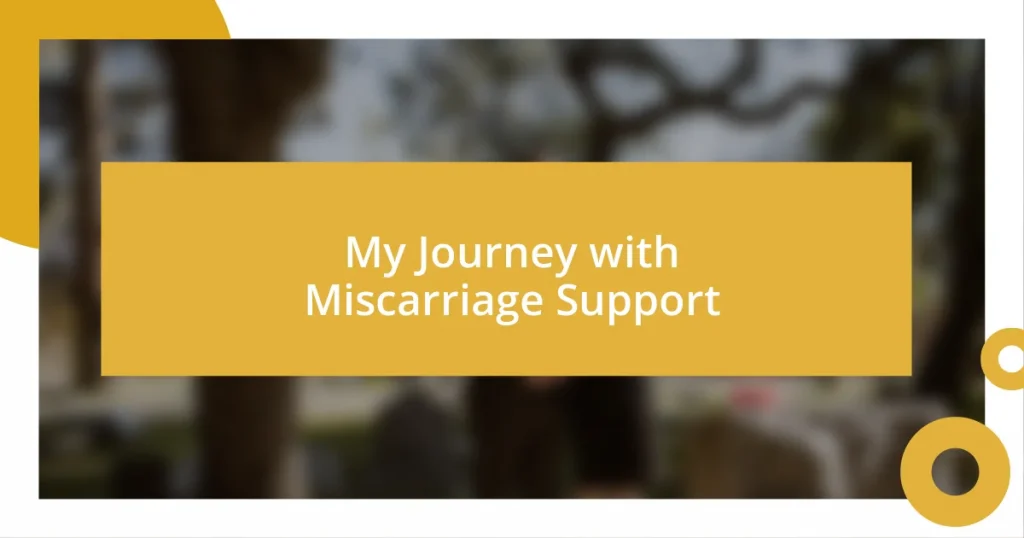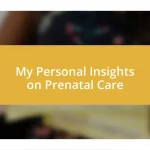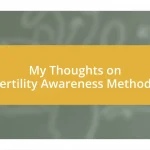Key takeaways:
- Miscarriage encompasses profound emotional and physical challenges, leading to feelings of isolation and stigma, highlighting the need for open dialogue and support.
- Engaging with support networks—whether professional counseling, peer groups, or online forums—offers essential validation and healing through shared experiences and empathy.
- Embracing emotional expression, creating memorial rituals, and sharing personal stories significantly aid in processing grief and moving forward after a loss.
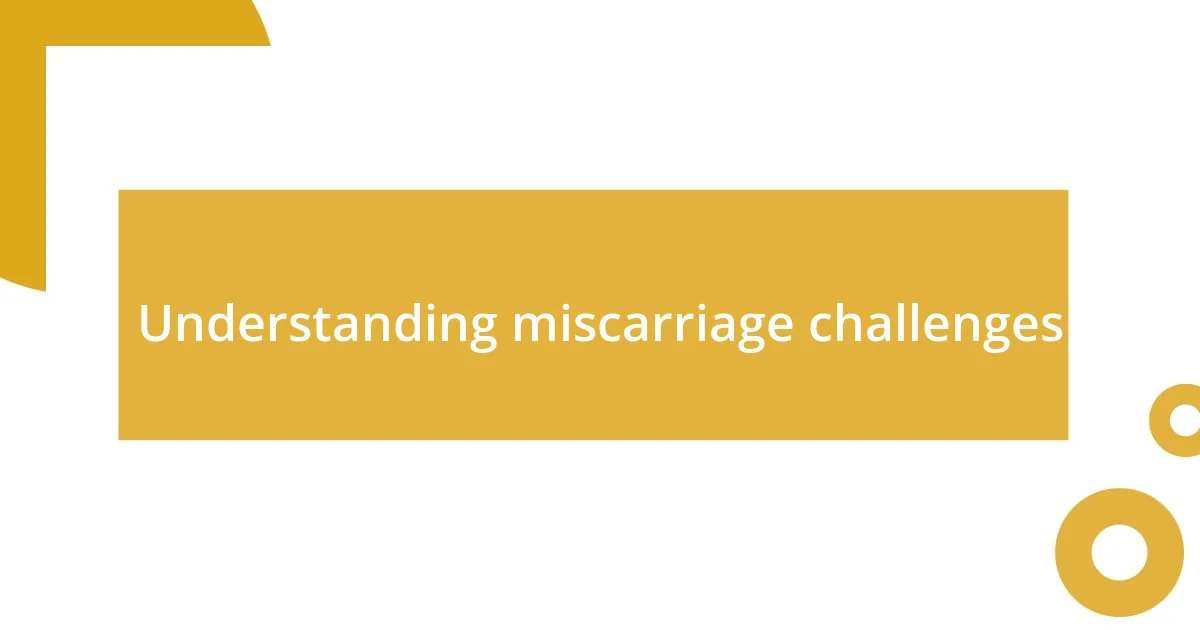
Understanding miscarriage challenges
Miscarriage is not just a physical loss; it involves deep emotional turmoil. I remember feeling like I was riding a roller coaster of grief and confusion, questioning everything I had done during my pregnancy. Have you ever felt that overwhelming sense of guilt or helplessness? It’s frightening to realize how something so personal can leave you feeling so isolated.
On top of the emotional maze, the physical challenges can also be daunting. There’s the pain, the uncertainty of what your body is going through, and the aftermath of adjusting back to your daily life. I found myself torn between wanting to discuss my experience and withdrawing into my shell, unsure of how others might react. How can we navigate this complex landscape when every day feels like a reminder of loss?
Moreover, there’s a stigma surrounding miscarriage that can make it feel even more challenging. I often sensed a silence from those around me, as if discussing my loss was taboo. This can lead one to suffer in solitude, amplifying feelings of loneliness. What if we opened up the dialogue about miscarriage? Sharing these stories could be a powerful tool for healing, not just for ourselves, but for society at large.
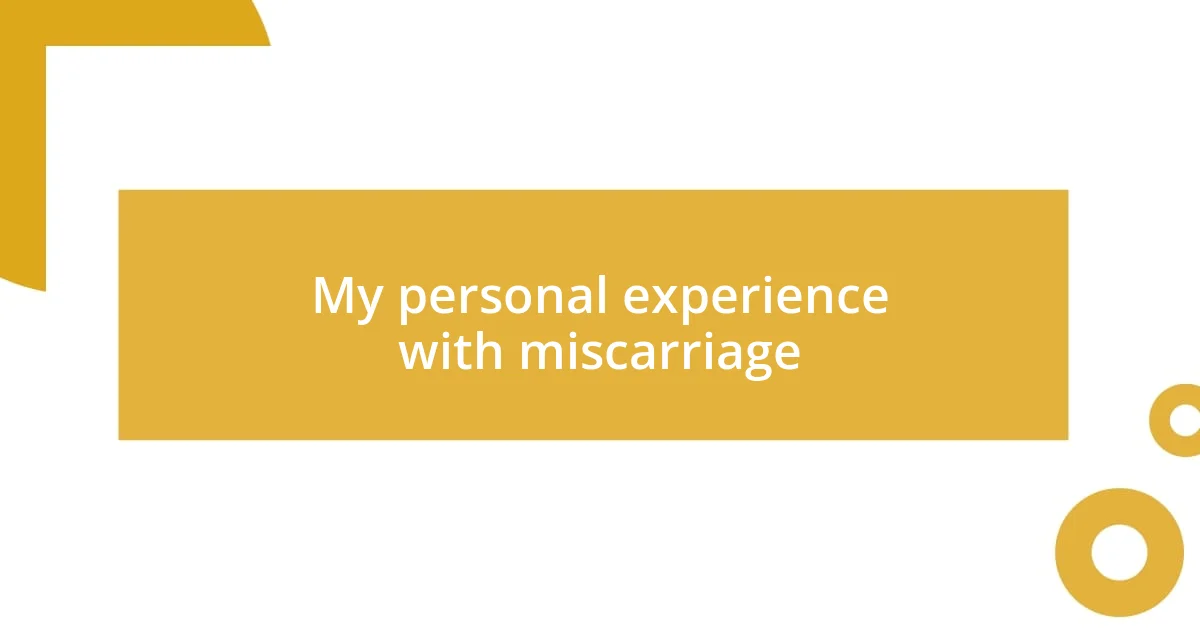
My personal experience with miscarriage
The moment I learned I had lost my baby, a feeling of immense emptiness washed over me. I recall sitting quietly in my living room, the echoes of hope fading into a haunting silence. It was as if the world continued to spin while I was stuck in a moment of disbelief, grappling with the fact that I’d never hold that little miracle. I often found myself sitting in places that reminded me of my pregnancy, feeling a pang of nostalgia mixed with a profound sense of loss.
- I felt isolated despite being surrounded by supportive friends and family, fearing they couldn’t truly understand my pain.
- The days following my miscarriage were a blur; I was caught between crying and trying to appear ‘normal.’
- I vividly remember a friend asking how I was doing, and I hesitated, unsure if I should share my heartache.
- The simplest of things, like seeing baby clothes on display, would pinch my heart and trigger the waves of grief.
- Over time, I learned that expressing my feelings, whether to a trusted friend or through journaling, became a vital part of my healing process.
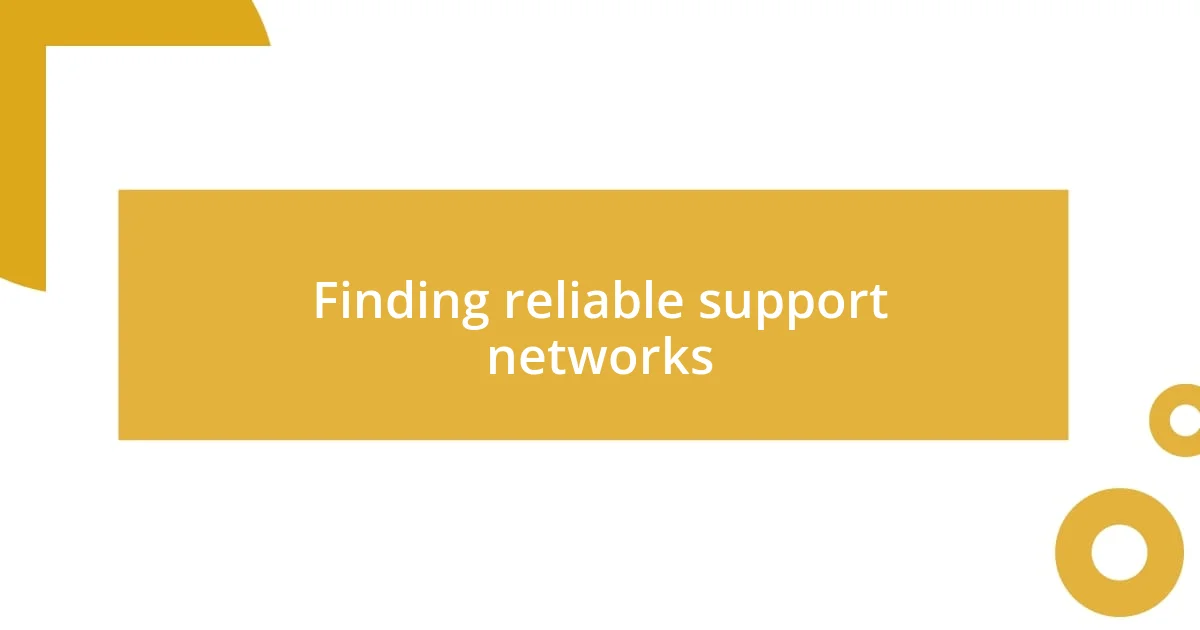
Finding reliable support networks
Finding a reliable support network during the turmoil of miscarriage can feel like searching for a lifeline. I remember when I first reached out to a local support group; it was daunting, yet there was an instant connection with others who had walked a similar path. They understood the unspeakable heartache and shared their stories, creating a bond that helped alleviate my feelings of isolation. Have you ever felt that sense of belonging in a room full of strangers? It’s incredibly validating.
Exploring different avenues for support is essential. I found online forums particularly helpful, especially in those quiet late-night moments when my mind was racing. Engaging in these discussions allowed me to share my feelings with a broader community, benefiting from diverse perspectives that really enriched my understanding. Remembering that not all support is the same, I learned to seek those groups that resonated with my emotions, finding comfort in shared stories and experiences.
Comparing formal counseling with peer support showed me both paths offer unique benefits. Professional counselors provide structured guidance, while peer groups offer relatable empathy. In my experience, utilizing a mix of both paved the way for deeper healing. Finding that balance meant feeling supported yet understood, as I tried to piece together my emotional landscape post-miscarriage.
| Support Type | Benefits |
|---|---|
| Professional Counseling | Structured guidance and coping strategies |
| Peer Support Groups | Relatable experiences and shared stories |
| Online Forums | 24/7 access and diverse perspectives |
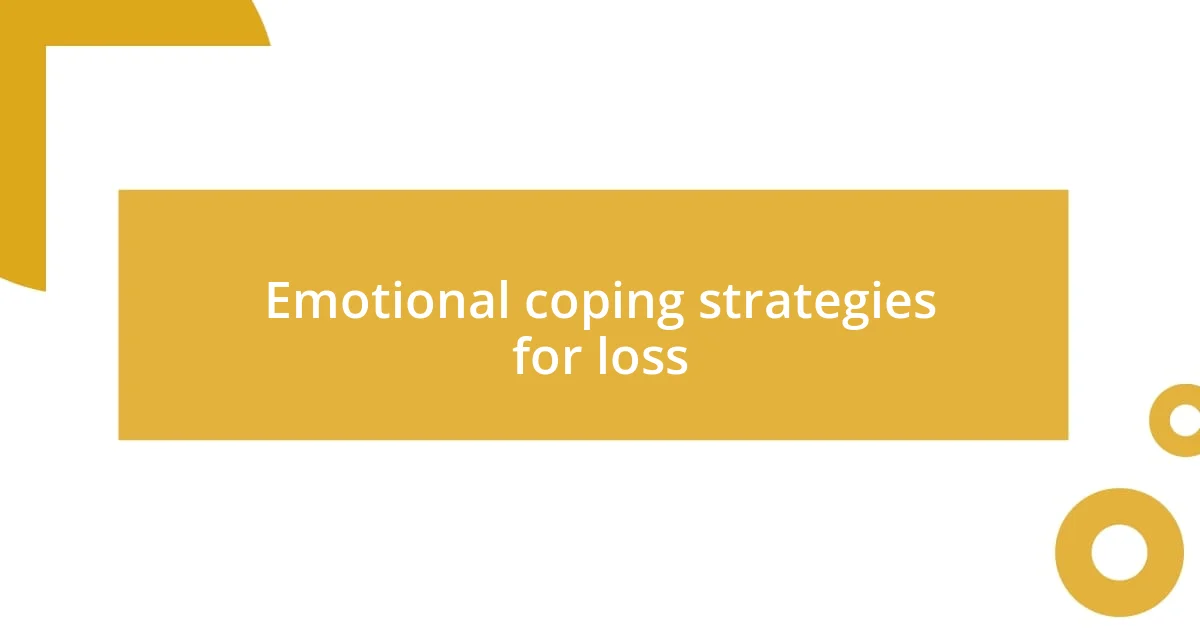
Emotional coping strategies for loss
One of the most powerful strategies I found for coping with my loss was embracing my emotions instead of suppressing them. I remember a particularly tough evening when everything felt like too much; instead of bottling it up, I curled up with a blanket and allowed myself to cry. Letting those emotions flow was liberating, almost like releasing a pressure valve that had been tightly closed. Have you ever felt that relief after finally allowing yourself to feel?
Another effective method was creating rituals to honor my baby. I found myself planting a small flower each month in memory of my loss, which became a meaningful way to reflect and celebrate the brief existence of my little one. It may seem like a simple act, but that connection to nature helped me process my grief. When you think about it, aren’t those tangible expressions of love important in healing?
Lastly, I discovered that connecting with art provided a unique form of solace. Whether it was painting, writing, or simply listening to music that resonated with my feelings, expressing myself creatively became therapeutic. One night, while working on a canvas, I immersed myself in colors that represented my journey—angry reds, soft blues, and hopeful yellows. This experience made me realize that art can be a profound outlet. How do you channel your emotions? Finding such outlets can often lead to unexpected insights and healing.
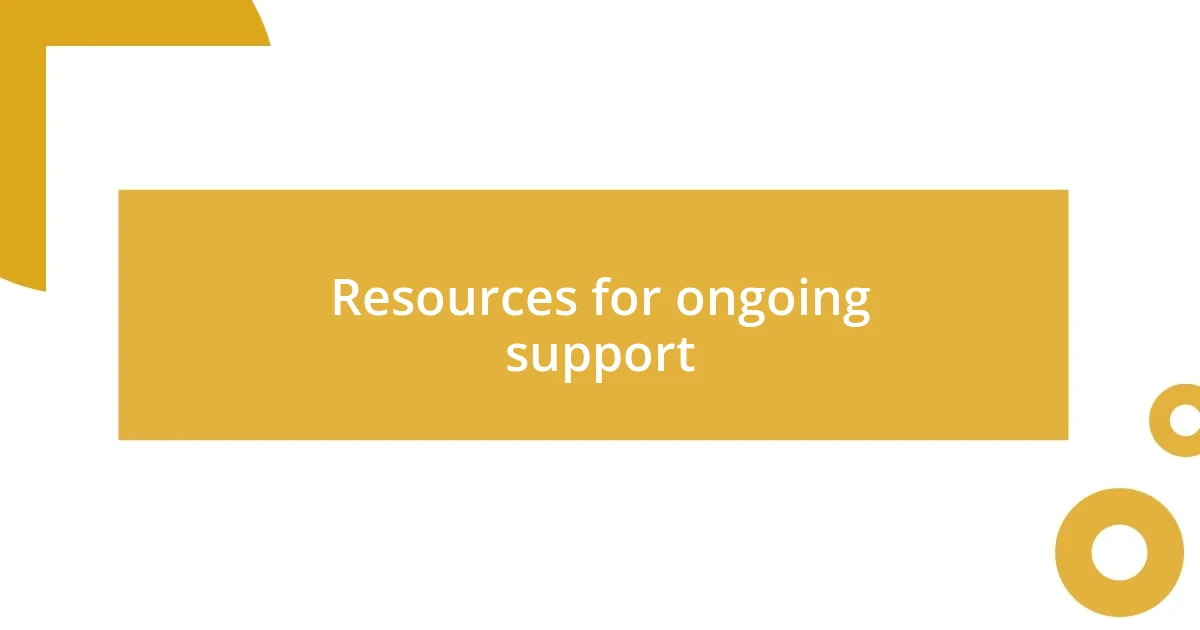
Resources for ongoing support
Finding ongoing support after experiencing a miscarriage is crucial, and I’ve found that online resources can truly bridge the gap when local options feel limited. I remember discovering websites dedicated to miscarriage support, and they were like a warm hug on a cold day. The articles, personal stories, and virtual communities turned into a safe haven where I could seek advice and share my own experiences without fear of judgment. Have you ever stumbled upon a resource that felt like it was written just for you?
Another invaluable resource has been books that explore grief and healing. I fondly recall a book on loss that I picked up during a particularly low point; I devoured each chapter, finding echoes of my own feelings within the pages. These stories became a reflection of my journey and provided me with methods to process my grief. If you’re a reader, have you ever found solace in a book that seemed to articulate your unspoken thoughts?
Additionally, reaching out to professionals, like therapists who specialize in bereavement, made a world of difference in my healing process. While talking to friends is helpful, there was something about having a trained expert guide me through my emotions that gave me clarity. I remember one session where my therapist helped me navigate feelings I didn’t even realize I was holding onto, revealing layers of grief I had buried. What’s your experience with professional support? It can be a transformative step toward understanding and embracing your feelings more fully.
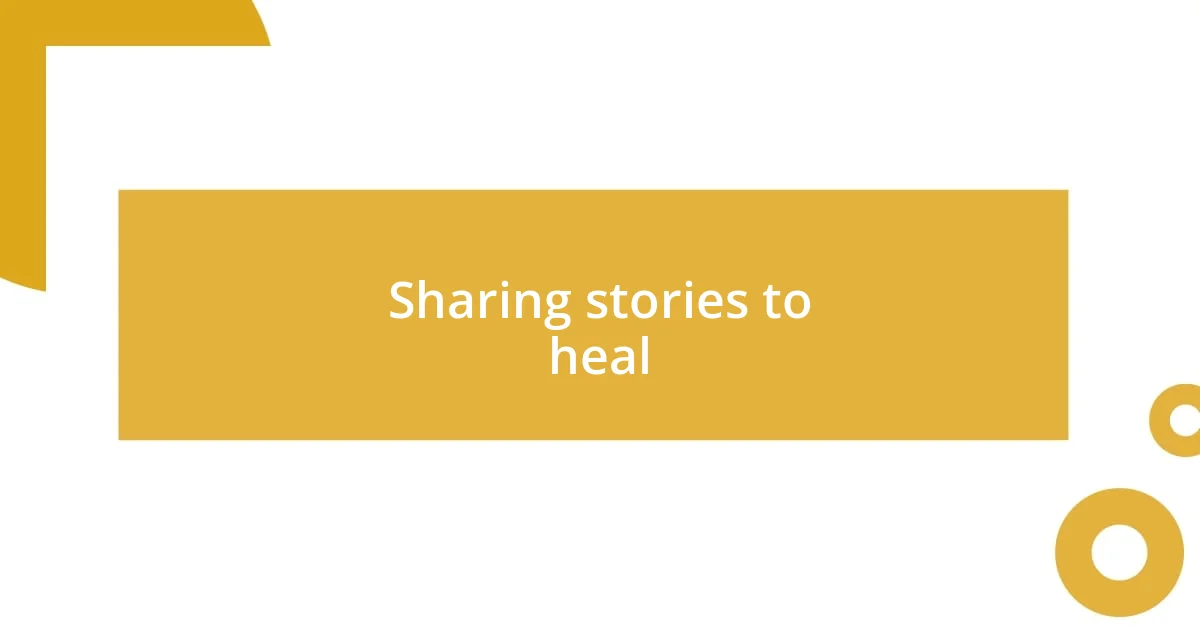
Sharing stories to heal
Sharing my story about miscarriage was one of the most daunting yet rewarding experiences I encountered on my healing journey. I remember sitting around a coffee table with close friends, finally voicing my pain after weeks of silence. As I spoke, I noticed everyone leaning in, their eyes filled with understanding. It struck me then—the power of vulnerability. Have you ever found that speaking your truth not only liberates you but also invites others to share their own stories?
In another instance, I joined an online support group where members shared their experiences with such honesty. One woman’s story about her loss resonated deeply with me, echoing emotions I thought I was alone in feeling. Each shared story became a thread that wove us closer, binding our heartbreaks together. Sharing these narratives was like holding a mirror to my grief, helping me recognize the shared struggle. Isn’t it comforting to realize that your pain is part of a larger tapestry of healing?
Reflecting on those moments, I can’t help but ponder how storytelling acts as a balm for the soul. Each time I retold my journey, I felt a little lighter, almost as if my words were releasing the heaviness nestled in my heart. Even writing my experiences down allowed me to confront emotions I often avoided. I encourage you to consider—how might sharing your story, be it through writing or conversation, pave the way for your own healing? Embracing that possibility can truly be transformative.
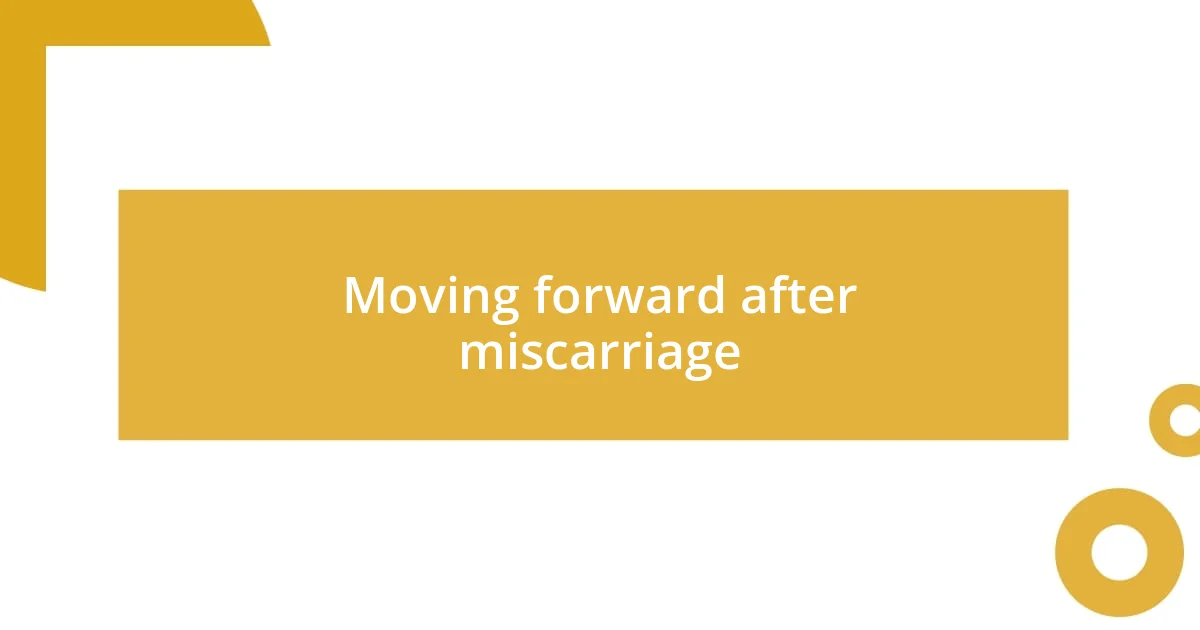
Moving forward after miscarriage
Moving forward after a miscarriage often feels like navigating uncharted territory. I recall walking through my neighborhood after my loss, feeling the weight of silence around me. Each step was heavy, and yet, as time passed, I discovered that engaging with nature—taking long walks or just sitting beneath a tree—had a way of easing my mind. Have you ever found that nature can be a partner in healing, providing solace in its quiet beauty?
As I sought to create new memories, I found comfort in small traditions. I started lighting a candle on certain days to honor my lost little one, which transformed those days from moments of sorrow into opportunities for reflection and love. It made me realize that moving forward doesn’t mean forgetting; instead, it’s about integrating those memories into my life. Have you considered any unique ways to remember your journey?
Slowly but surely, I learned to redefine “family” beyond conventional boundaries. I began to embrace different forms of relationships, deepening connections with friends who understood my grief. These evolving bonds became a source of strength, as we shared laughter and tears over meals or during our late-night talks. Isn’t it fascinating how, through shared experiences, we can find new dimensions of companionship that lift our spirits as we move forward?









